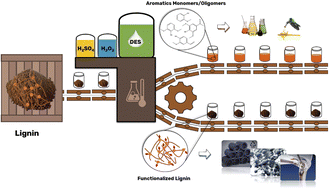Conversion of Organosolv and Kraft lignins into value-added compounds assisted by an acidic deep eutectic solvent†
Abstract
In this study, an acidic deep eutectic solvent (DES) was used as a benign solvent to valorise technical lignins by breaking down their structure into value-added aromatic compounds. The action of an acidic DES composed of cholinium chloride ([Ch]Cl) and oxalic acid (Oxa), at a molar ratio of 1 : 1, towards the depolymerisation of Kraft and Organosolv lignins (KL and OL) was studied under mild conditions (80 °C, for 1 to 6 h). Furthermore, the addition of hydrogen peroxide (H2O2) or sulfuric acid (H2SO4) as a co-catalyst was also performed. The obtained data showed maximum yields between 26.1 wt% and 27.8 wt% of lignin depolymerisation products after KL and OL breakdown. Moreover, the profile of depolymerisation products was distinct between the examined lignins as well as between acidic ([Ch]Cl : Oxa and [Ch]Cl : Oxa/H2SO4) and acidic oxidative treatments ([Ch]Cl : Oxa/H2O2). The acidic treatments of KL favoured the formation of syringol and acetosyringone, while vanillic and syringic acids were the main products in the acidic treatments of OL. On the other hand, the presence of H2O2 in the DES enabled the ability to promote the electrophilic substitutions of chloride from [Ch]Cl in the aromatic ring of lignin monomers. After depolymerisation, the regenerated lignin samples presented a different molecular weight, while FT-IR data showed structural changes, including esterification with oxalic acid and formation of phenolic groups as a consequence of aryl ether bond breakdown. The insights gained in this study provide a better understanding on lignin depolymerisation with a DES (in the presence and absence of co-catalysts) and envisage process integration through the production of lignin monomers (and oligomers) combined with the functionalisation of regenerated lignin.



 Please wait while we load your content...
Please wait while we load your content...